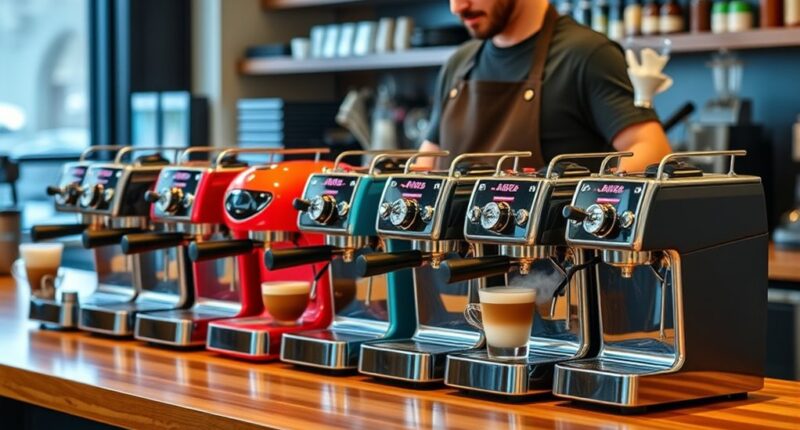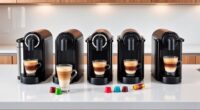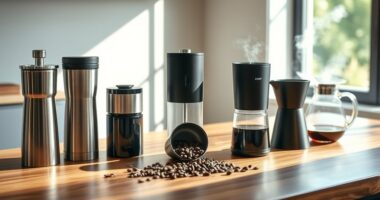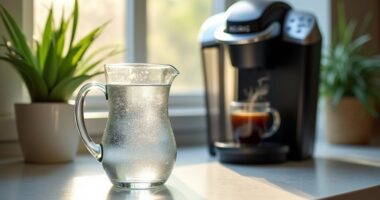In 2025, consider these top small commercial espresso machines for your coffee shop: the Espresso Machine with Grinder and Milk Frother, 20 Bar Espresso Machine with Built-in Coffee Grinder, Gevi Commercial Espresso Maker, Breville Barista Express Impress, and the Breville Barista Touch. Each offers features like powerful grinders and efficient milk frothing. When choosing, think about size, pressure, grinder quality, and ease of use. More insights are available on how to pick the best machine for your needs.
At a Glance
- Look for machines with a minimum pressure of 9 bars for optimal flavor extraction in small commercial settings.
- Select models with conical burr grinders for consistent coffee grounds and better extraction quality.
- Consider commercial-grade steam wands for efficient milk frothing and creating diverse coffee beverages.
- Evaluate user-friendly designs with one-touch controls to simplify operation for baristas of all skill levels.
- Regular maintenance features, like removable drip trays and easy cleaning processes, are essential for long-term performance and hygiene.
Espresso Machine with Grinder and Milk Frother
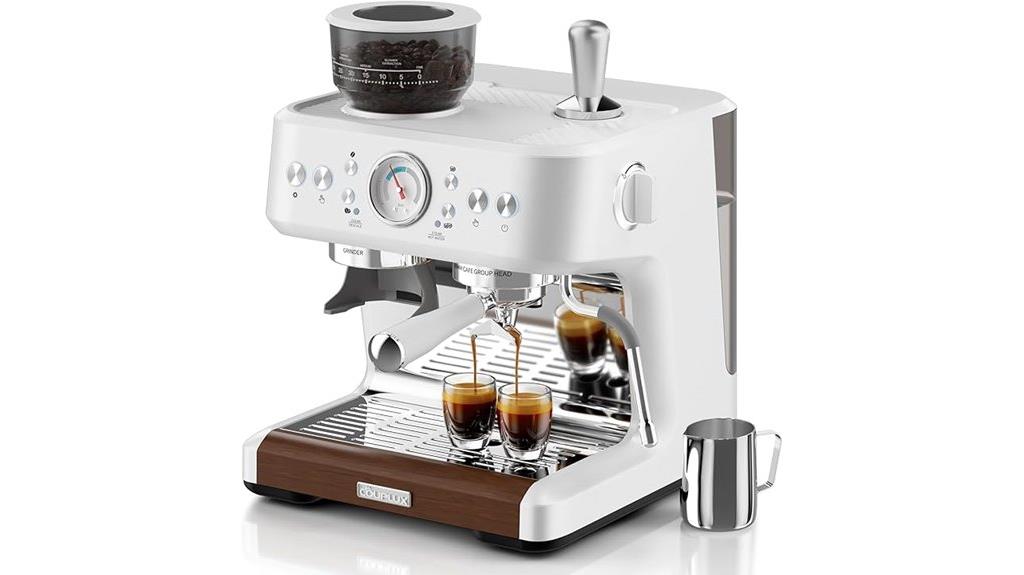
When searching for the best small commercial espresso machines, the COUPLUX Espresso Machine stands out, especially for those who want a complete brewing solution in a compact design. This machine features a powerful conical burr grinder with 30 settings, ensuring consistent grounds for the best flavor. Its 58MM stainless steel group head, equipped with over 700 water outlets, delivers café-level performance. Plus, the commercial-grade steam wand offers twice the steam power for quick milk texturing. With one-touch controls and an auto pressure relief valve, it’s user-friendly and safe, making it an excellent choice for both beginners and coffee enthusiasts alike.
Best For: Coffee enthusiasts and beginners looking for a compact espresso machine with integrated grinder and milk frother for café-quality drinks at home.
Pros:
- Powerful conical burr grinder with 30 settings for precise grinding and optimal flavor extraction.
- User-friendly design with one-touch controls and an auto pressure relief valve for safe operation.
- Commercial-grade steam wand that delivers twice the steam power for efficient milk frothing and latte art.
Cons:
- Larger footprint at 29.9 pounds, which may not be ideal for very small kitchens.
- Limited warranty period of one year may not be sufficient for heavy commercial use.
- Requires some practice to master milk frothing techniques for beginners.
20 Bar Espresso Machine with Built-in Coffee Grinder
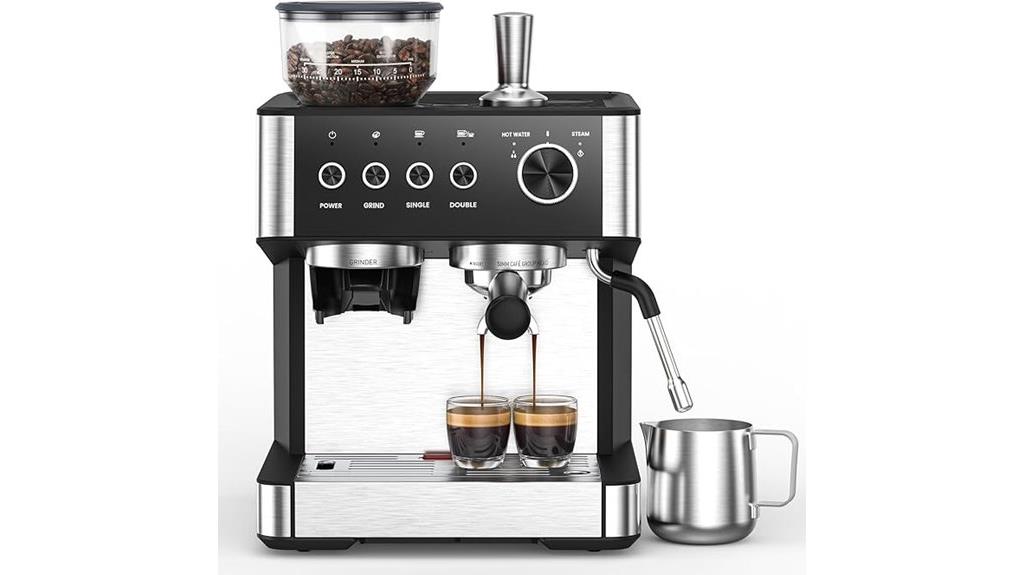
The 20 Bar Espresso Machine with a built-in coffee grinder stands out as an ideal choice for coffee enthusiasts who want barista-quality beverages at home or in a small office setting. This semi-automatic machine features an anti-clog grinder and a 58mm commercial portafilter. With a powerful steam wand, it crafts silky milk for lattes and creamy froth for cappuccinos. The upgraded grinding technology guarantees mess-free preparation, while the detachable drip tray and 2.8-liter water tank simplify maintenance. Rated 4.4 out of 5 stars, it’s a reliable option for delivering high-quality espresso without the coffee shop expense.
Best For: Coffee enthusiasts looking for a high-quality espresso machine that delivers barista-level beverages at home or in a small office setting.
Pros:
- Semi-automatic functionality allows for customizable coffee volume and brewing pressure.
- Built-in grinder with anti-clog technology ensures mess-free coffee preparation.
- Powerful steam wand creates professional-quality milk froth for various coffee drinks.
Cons:
- Some users report insufficient pressure for brewing, affecting espresso quality.
- The machine’s weight may make it less portable for some users.
- Initial setup and programming may require a learning curve for new users.
Gevi Commercial Espresso Maker
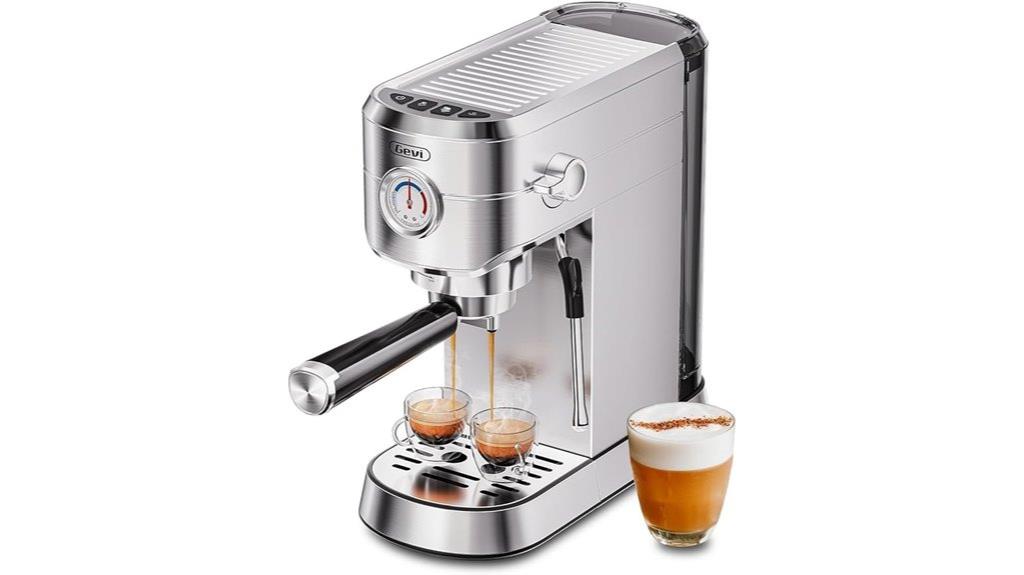
For those seeking a reliable and efficient espresso machine for small commercial settings, the Gevi Commercial Espresso Maker stands out with its impressive 20-bar pump, ensuring ideal flavor extraction for every cup. Its stainless steel design not only looks stylish but also offers durability. The user-friendly controls and semi-automatic brewing process make it easy to craft barista-quality coffee. You’ll appreciate the powerful steam system for creating silky microfoam, perfect for lattes. With a compact size and a hot water function, this machine fits seamlessly into any workspace, enhancing your coffee offerings while being easy to maintain.
Best For: Small commercial settings and coffee enthusiasts seeking a reliable and efficient espresso machine. These machines not only deliver exceptional espresso but also cater to those who appreciate the nuances of flavor. For users looking to enhance their brewing experience, exploring the best whole bean espresso options will elevate the quality of each cup. With a focus on consistency and ease of use, these machines are perfect for both novices and seasoned baristas alike.
Pros:
- User-friendly controls and semi-automatic brewing for easy barista-quality coffee preparation.
- Compact and stylish stainless steel design that fits various kitchen decors.
- Powerful steam system for creating silky microfoam, ideal for lattes and cappuccinos.
Cons:
- Occasional overheating reported after extended frothing sessions.
- Some users have noted concerns regarding noise levels during operation.
- Build quality issues have been mentioned by a few customers.
Breville Barista Express Impress Espresso Machine (BES876BSS)
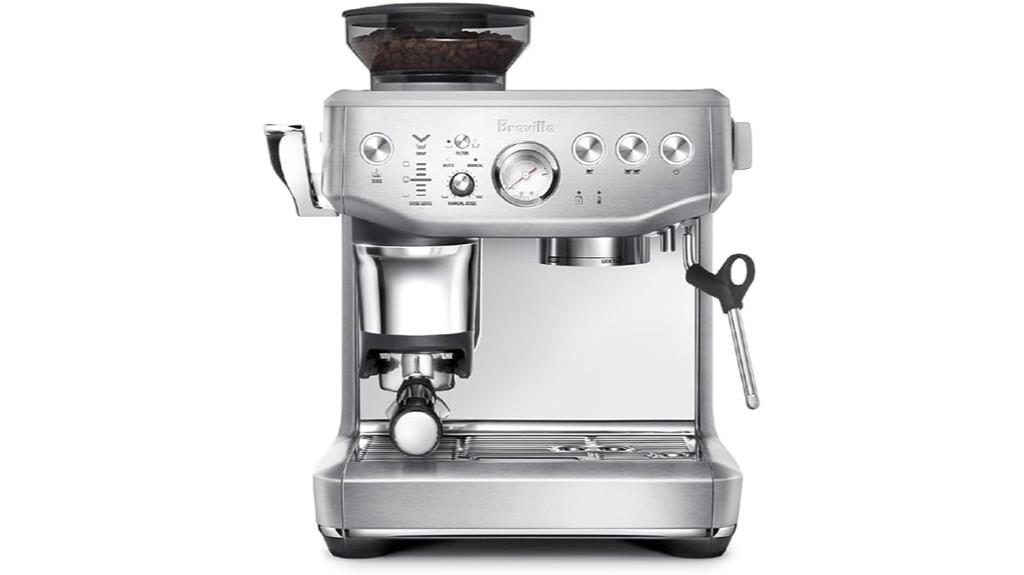
Breville’s Barista Express Impress Espresso Machine (BES876BSS) stands out as an ideal choice for coffee enthusiasts seeking to replicate café-quality espresso at home. This brushed stainless steel machine features an intelligent dosing system and an impress puck system, simplifying your espresso-making process. With a built-in conical burr grinder offering 25 grind settings, you can achieve precise extraction for your coffee. The thermocoil heating system guarantees peak temperature control. While there’s a learning curve, many users appreciate the consistent shots and ease of cleaning. Despite some concerns about grind performance, it remains a popular investment for quality espresso.
Best For: Coffee enthusiasts who want to replicate café-quality espresso at home with a user-friendly machine.
Pros:
- Intelligent dosing system ensures the perfect coffee level for consistent shots.
- Integrated conical burr grinder with 25 grind settings allows for precise extraction tailored to your taste.
- Easy to clean and operate once familiar with the machine, making maintenance straightforward.
Cons:
- Learning curve associated with mastering grind settings, dosing, and timing may be challenging for beginners.
- Some users report inconsistent grind performance and issues with bean flow.
- Regular descaling is necessary, especially in hard water areas, which may be inconvenient for some users.
Espresso Machine 20 Bar with Milk Frother
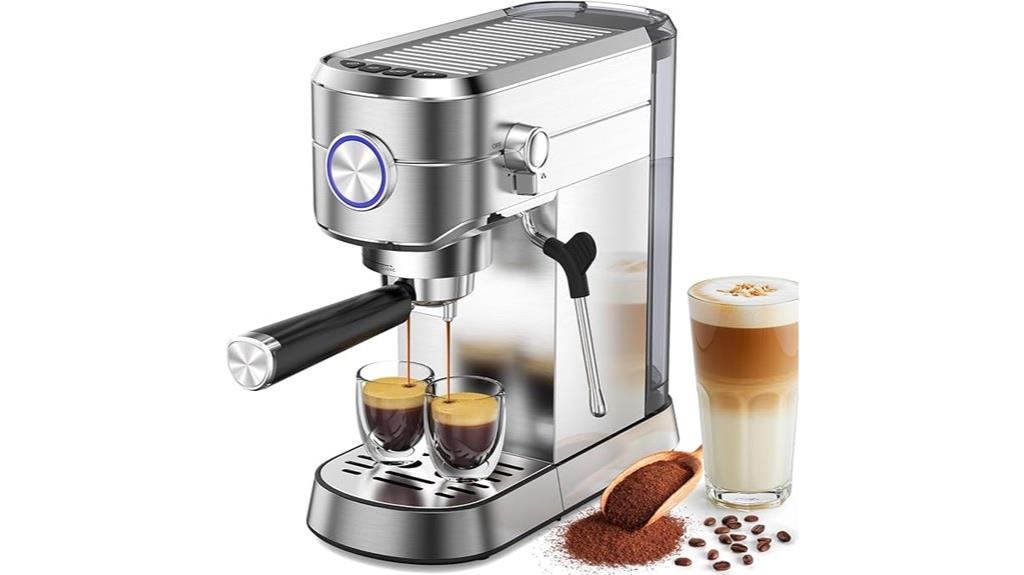
Achieving an impressive 20-bar pressure, the COWSAR Espresso Machine with Milk Frother is an excellent choice for those looking to elevate their coffee experience at home or in a small commercial setting. With a stainless steel design and compact dimensions, it fits easily in tight spaces. The 40 oz removable water tank supports multiple brews. Instant heating technology guarantees quick preparation, while the powerful steam wand froths milk perfectly for cappuccinos and lattes. User-friendly features like automatic flow-stop and dual drip trays enhance convenience. Rated 4.7 stars, it delivers coffee shop quality with reliability, making it a worthy investment.
Best For: Home baristas and coffee enthusiasts seeking a compact and efficient espresso machine for high-quality brews.
Pros:
- High Pressure: Achieves an optimal 20-bar pressure for excellent espresso extraction.
- Quick Heating: Instant heating technology allows for rapid brewing without delays.
- User-Friendly: Simple operation and maintenance, making it suitable for beginners.
Cons:
- Limited Capacity: The 40 oz water tank may require frequent refilling for multiple servings.
- Compact Size: While great for small kitchens, it may not accommodate larger coffee-making needs.
- Steam Wand Learning Curve: Users may need practice to master milk frothing techniques effectively.
Gaggia RI9380/51 Classic Evo Pro Espresso Machine, Industrial Grey, Small
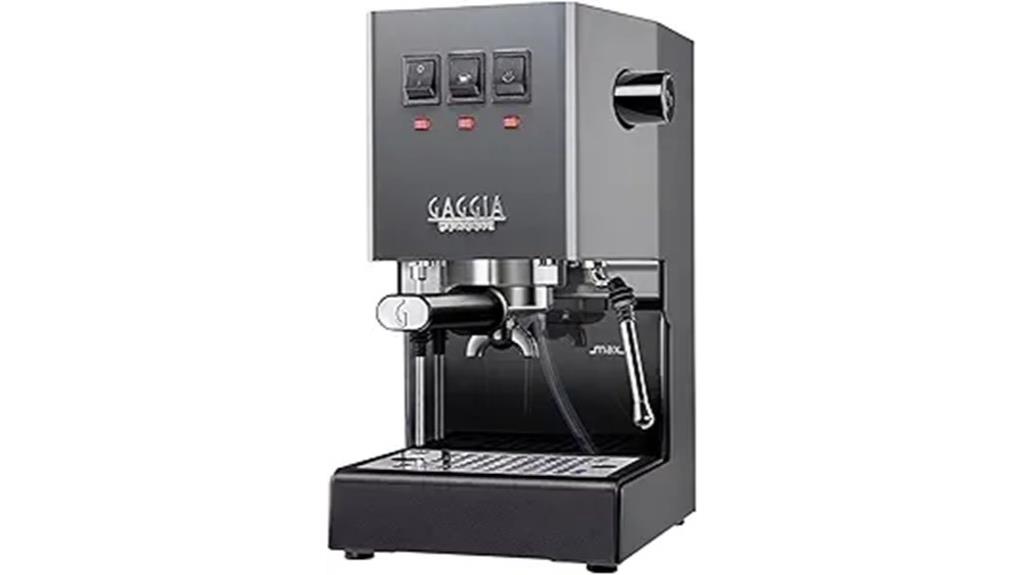
The Gaggia RI9380/51 Classic Evo Pro Espresso Machine stands out as an excellent choice for coffee enthusiasts seeking a small yet powerful appliance. With dimensions of 8D x 9.5W x 14.2H inches and a solid steel housing, it weighs 20 pounds, making it durable and compact. Operating at 9 bars of pressure, this semi-automatic machine brews prosumer-quality espresso. Its commercial steam wand creates velvety microfoam, perfect for latte art. Users appreciate its versatility with various filter baskets and the supportive online community. Regular maintenance and practice are essential, but the espresso quality makes it a rewarding choice for your coffee shop.
Best For: Coffee enthusiasts seeking a compact yet powerful espresso machine that delivers professional-quality shots and offers versatility in brewing options.
Pros:
- Durable solid steel housing ensures longevity and stability.
- Produces high-quality espresso with 9-bar pressure for rich flavor extraction.
- Versatile with various filter baskets and a commercial steam wand for milk texturing.
Cons:
- Initial learning curve may be challenging for beginners.
- Requires regular maintenance and practice for optimal performance.
- Additional upgrades, like a PID controller, may be necessary for precise temperature control.
DeLonghi La Specialista Maestro Espresso Machine
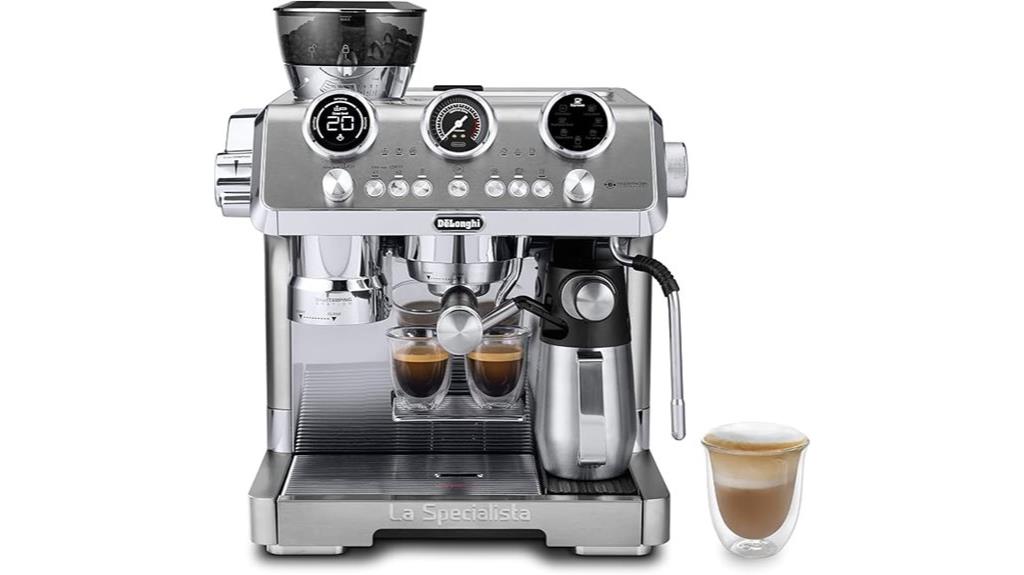
For coffee enthusiasts who appreciate precision and customization, the DeLonghi La Specialista Maestro Espresso Machine stands out as an excellent choice in the domain of small commercial espresso machines. This machine features a built-in grinder with 15 settings, ensuring the perfect grind size. With a 19-bar Italian pump, it maintains consistent brewing pressure. You can select from eight beverage presets, including Espresso and Cold Brew, while the Smart Tamping Technology guarantees even extraction. Its stainless steel design not only looks sleek but also offers durability. Though some users mention minor limitations, overall, it’s praised for ease of use and quality espresso.
Best For: Coffee enthusiasts who value precision, customization, and quality in their espresso-making experience.
Pros:
- Built-in grinder with 15 settings for optimal grind size.
- Eight beverage presets and Smart Tamping Technology for consistent extraction.
- Durable stainless steel design with a large water tank for convenience.
Cons:
- Limited movement of the steaming wand may restrict frothing options.
- Quick auto shutoff could interrupt the brewing process.
- Some users report issues with dark roast settings during troubleshooting.
Breville Barista Touch Espresso Machine BES880BSS, Brushed Stainless Steel
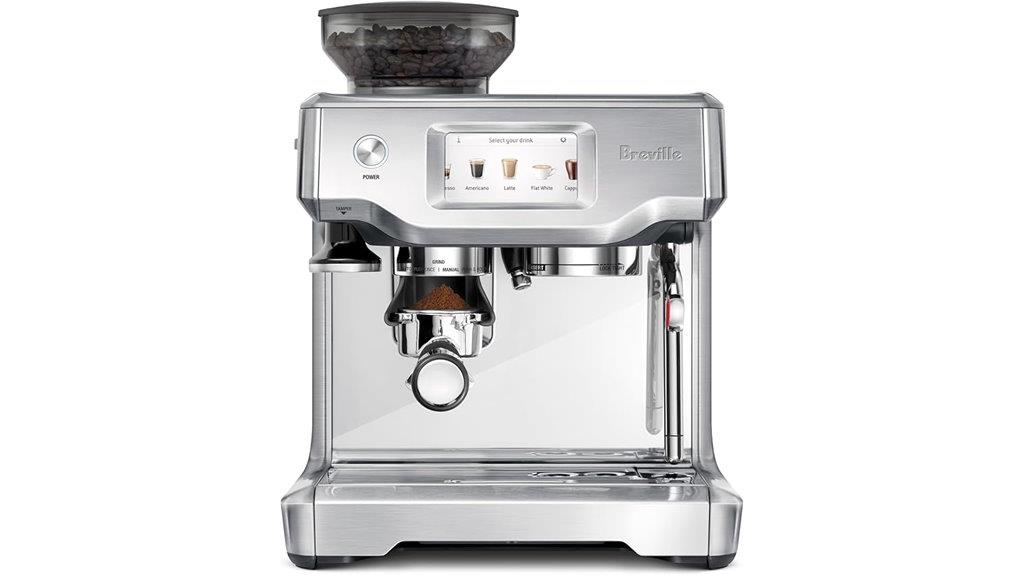
If you’re looking for a versatile espresso machine that can elevate your home brewing experience, the Breville Barista Touch Espresso Machine BES880BSS stands out with its integrated grinder and automatic milk texturing features. This fully automatic machine includes a precision conical burr grinder, allowing you to control the dose for maximum flavor. With a ThermoJet heating system, it reaches ideal extraction temperature in just three seconds. The touchscreen interface makes it user-friendly, offering programmable settings for lattes and cappuccinos. Plus, its automatic milk texturing helps you create perfect microfoam for café-quality drinks right at home.
Best For: Coffee enthusiasts who want a fully automatic espresso machine that offers café-quality drinks at home with customizable features.
Pros:
- Integrated grinder for maximum flavor with dose control.
- User-friendly touchscreen interface with programmable settings for various coffee types.
- Automatic milk texturing for creating perfect microfoam, ideal for lattes and cappuccinos.
Cons:
- Some users experienced durability issues after two years of use.
- The frothing wand can splash during cleaning, requiring careful handling.
- Quality of coffee can be dependent on the type of beans used and may require adjustments in grind size.
Breville Barista Express Espresso Machine BES870XL, Brushed Stainless Steel
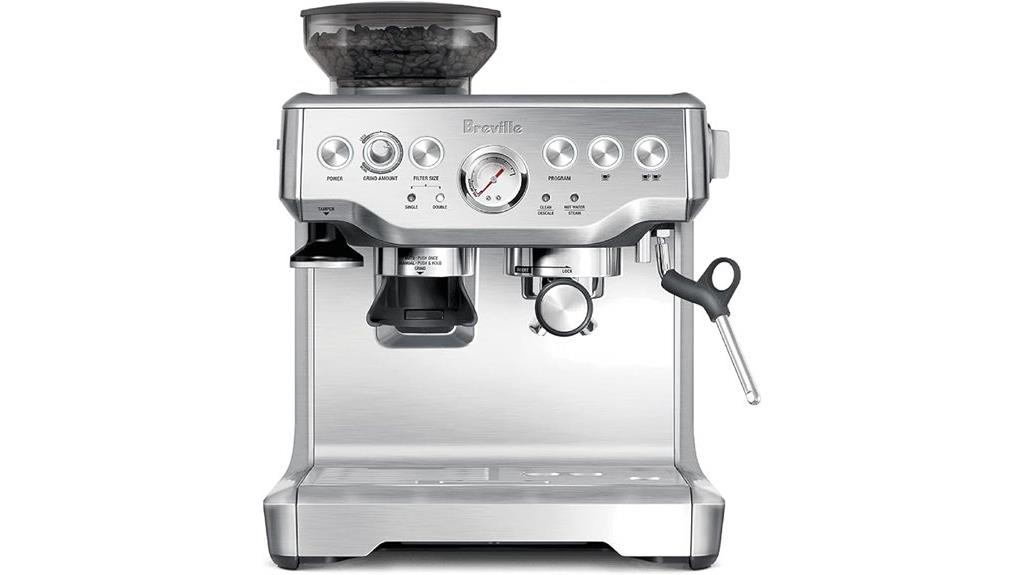
Breville’s Barista Express Espresso Machine BES870XL stands out with its integrated conical burr grinder, making it an excellent choice for coffee enthusiasts who want to enjoy freshly ground beans in the comfort of their home or small commercial space. This semi-automatic machine features a user-friendly design, with an adjustable grind size and low-pressure pre-infusion for balanced extraction. Its powerful steam wand allows you to create microfoam for lattes and cappuccinos. With a customer rating of 4.4 out of 5 stars, many users praise its durability, ease of use, and the high-quality espresso it produces, comparable to coffee shop standards.
Best For: Coffee enthusiasts and beginners looking for a reliable, easy-to-use espresso machine that delivers high-quality coffee at home.
Pros:
- Integrated grinder ensures fresh coffee grounds for optimal flavor extraction.
- User-friendly design makes it suitable for beginners and experienced baristas alike.
- Durable construction reported by users leads to long-lasting performance.
Cons:
- Manual operation may not appeal to those preferring fully automatic machines.
- Regular maintenance is necessary to keep the machine in optimal working condition.
- Initial cost may be higher compared to other espresso machines in the market.
Espresso Machine with Grinder & Milk Frother
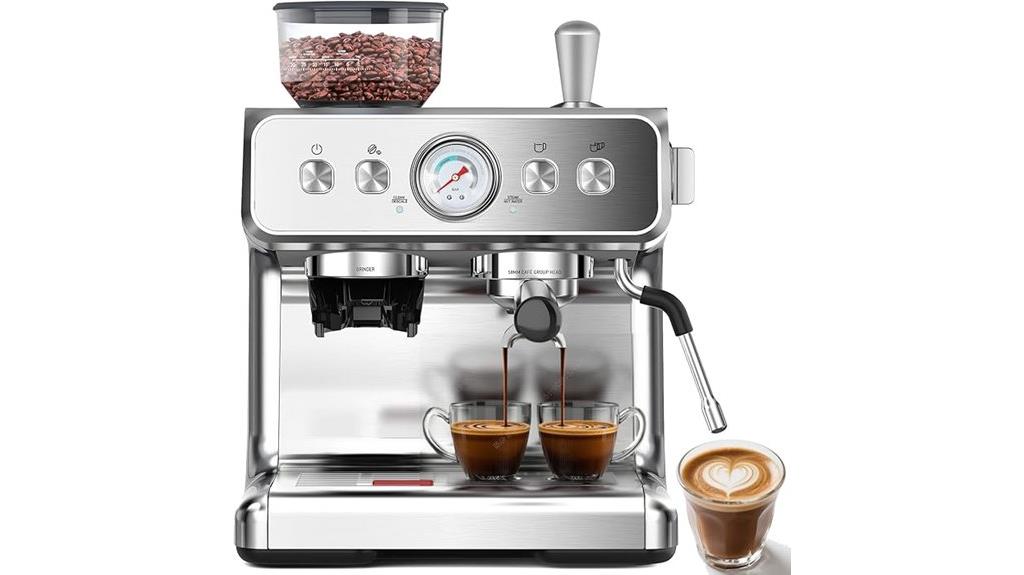
A standout feature of the espresso machine with grinder and milk frother is its integrated conical burr grinder, offering 30 adjustable grind sizes to cater to your preference for fresh coffee. With a 20-bar pressure pump, it consistently produces rich espresso topped with smooth crema. Low-pressure pre-infusion enhances flavor, while advanced PID technology guarantees stable temperature control for consistent results. The powerful steam wand creates barista-quality microfoam, perfect for lattes and cappuccinos. Its sturdy stainless steel design is easy to clean, featuring a detachable drip tray and removable water tank, making it a reliable choice for your coffee shop.
Best For: Home baristas looking to create café-quality espresso and milk-based drinks with a versatile machine.
Pros:
- Integrated conical burr grinder with 30 adjustable grind sizes for fresh, customizable flavor.
- Advanced PID technology ensures stable temperature control for consistent espresso extraction.
- Powerful steam wand allows for barista-quality microfoam, ideal for lattes and cappuccinos.
Cons:
- Some users report a learning curve in mastering grind size and milk frothing techniques.
- Mixed reviews on performance consistency, particularly regarding brewing times.
- Average rating suggests room for improvement in certain features, with some dissatisfaction noted.
Factors to Consider When Choosing Small Commercial Espresso Machines
When you’re choosing a small commercial espresso machine, several key factors come into play. You’ll want to take into account the size and dimensions to guarantee it fits your space, along with the pressure and performance for ideal brewing. Don’t overlook aspects like grinder quality, milk frothing capability, and ease of use, as these can greatly impact your coffee-making experience.
Size and Dimensions
Choosing the right size and dimensions for a small commercial espresso machine is essential for ensuring it fits comfortably in your workspace. Consider models that range from compact dimensions of about 8D x 5.5W x 12H inches to larger machines measuring up to 14D x 16.5W x 18.5H inches. Weights vary too, with some machines as light as 8.6 pounds, which makes them easier to move, while heavier options over 29 pounds suggest sturdier construction. A removable water tank is vital, with capacities typically ranging from 2.8 liters to 40 ounces, affecting refill frequency. Finally, think about height for accommodating various cup sizes, especially if you plan to serve taller mugs for lattes and cappuccinos.
Pressure and Performance
Understanding the pressure and performance of a small commercial espresso machine is essential for achieving the best possible coffee. The pressure must reach a minimum of 9 bars for optimal flavor extraction, but higher ratings between 15-20 bars can enhance richness and crema. Consistent pressure during brewing is critical to avoid under-extraction or over-extraction, which can negatively affect taste. Look for machines with advanced pressure control systems, such as pre-infusion features, which gradually increase pressure for uniform extraction and improved flavor complexity. Additionally, consider the heating technology; stable temperature control is essential to maintain ideal brewing conditions, ensuring every cup of espresso meets your quality standards. Prioritize these factors to elevate your coffee offerings.
Grinder Quality
Grinder quality plays a significant role in the performance of small commercial espresso machines, as it directly affects the consistency of your coffee grounds. Conical burr grinders are often preferred because they provide a uniform particle size, vital for ideal extraction. Machines with advanced grinding technology, like anti-clog systems and multiple grind settings, allow you to control grind size precisely, enhancing flavor and freshness. A higher quality grinder reduces the risk of jams, ensuring a smooth workflow during busy periods. Additionally, integrating an efficient grinder saves counter space and simplifies operations, letting baristas prepare drinks quickly. Consistent grind quality is essential for producing rich crema and balanced flavors, typically requiring a pressure range of 9 to 20 bars.
Milk Frothing Capability
When it comes to small commercial espresso machines, milk frothing capability is an essential aspect that can elevate your beverage offerings. A commercial-grade steam wand can deliver higher steam pressure, allowing you to achieve faster and drier milk texturing, which is vital for creating microfoam ideal for latte art. Machines with powerful steam wands, typically 10mm or larger, produce twice the steam power compared to standard models. This enhances both efficiency and froth quality. Additionally, consider stainless steel wands for their durability and better heat retention. A frothing system that allows you to adjust temperature and texture can cater to diverse customer preferences, ultimately improving the coffee experience in your shop.
Ease of Use
Choosing a small commercial espresso machine requires careful consideration of its ease of use, especially if you want to guarantee a smooth operation in your café or coffee shop. Look for machines with user-friendly interfaces, like one-touch controls or touchscreen displays, which make it simple for everyone to operate. Automatic milk frothing systems can help you create café-quality beverages effortlessly. Compact designs with detachable parts, such as water tanks and drip trays, allow for quick cleaning. If you’re considering a machine with an integrated grinder, adjustable grind settings can streamline your coffee preparation. Finally, make certain the machine comes with user manuals and support resources to help you navigate its features and troubleshoot any issues easily.
Maintenance Requirements
Maintaining a small commercial espresso machine is essential for ensuring its longevity and performance, especially if you rely on it daily. Regular descaling is important, particularly in areas with hard water, to prevent scale buildup. After each use, clean the milk frothing wand and other components to avoid milk residue, which can affect taste and hygiene. Look for machines with removable drip trays and water tanks, as these features simplify cleaning. It’s also critical to keep the grinder clean and calibrated; some machines offer removable grinders for easy access. Refer to the user manual for specific cleaning products and routines, ensuring your machine operates efficiently and consistently produces high-quality coffee. Regular maintenance will keep your espresso machine in top shape.
Price and Budget
Establishing a budget is a fundamental step in selecting the right small commercial espresso machine for your business. Prices can vary widely, ranging from a few hundred to several thousand dollars based on features and capabilities. Aim for a machine that balances initial cost with long-term savings, like those with built-in grinders or milk frothers, reducing the need for extra equipment. Research maintenance and operational costs, including replacement parts and servicing frequency. Don’t overlook the cost of quality coffee beans, as premium machines may require better ingredients for best results. If upfront costs are a concern, evaluate financing or rental options available from suppliers to make acquiring a commercial espresso machine more manageable.
Warranty and Support
When considering a small commercial espresso machine, warranty and support should be high on your list of priorities. First, review the warranty duration offered by the manufacturer; longer warranties often suggest greater confidence in durability and performance. Look for machines that provide responsive customer support, as timely assistance is vital for troubleshooting and minimizing downtime. Confirm the warranty covers both parts and labor, helping to mitigate potential repair costs. Check if the warranty includes specific provisions for commercial use, as some may only cover residential settings. Finally, consider the availability of spare parts and service options, as accessible support can enhance the longevity and functionality of your espresso machine, ultimately benefiting your coffee shop’s operations.
Frequently Asked Questions
How Much Coffee Can Small Commercial Espresso Machines Produce Daily?
Small commercial espresso machines can typically produce between 100 to 300 cups of coffee daily, depending on their capacity and usage. Factors like the machine’s size, the barista’s speed, and the demand during peak hours influence this output. If you’re running a busy coffee shop, it’s crucial to choose a machine that meets your daily needs. Always consider your specific requirements to guarantee you maintain quality while meeting customer demand effectively.
Are These Machines Suitable for High-Volume Coffee Shops?
Yes, small commercial espresso machines can be suitable for high-volume coffee shops, but it depends on specific models. Some machines are designed for efficiency and can handle a significant output, while others may struggle with demand during peak hours. When choosing a machine, consider its daily production capacity, brewing speed, and the number of group heads. Proper maintenance and staff training can also enhance performance in a busy setting.
What Is the Average Lifespan of a Small Commercial Espresso Machine?
The average lifespan of a small commercial espresso machine typically ranges from 5 to 15 years, depending on usage, maintenance, and quality. If you use it heavily, you might find it lasts closer to the lower end of that range. Regular cleaning and servicing can greatly extend its life. Investing in a reliable machine and following care guidelines will help guarantee you get the most out of your equipment over the years.
How Often Do Small Commercial Espresso Machines Require Maintenance?
Small commercial espresso machines typically require maintenance every three to six months, depending on usage. Regularly cleaning components like the brew group and steam wand is essential to guarantee peak performance. You should also descale the machine every few months to prevent mineral buildup. Additionally, check for any wear and tear on parts like gaskets and seals. Staying on top of maintenance helps extend the lifespan and efficiency of your espresso machine.
Do These Machines Come With Warranties or Service Plans?
Yes, most small commercial espresso machines come with warranties or service plans. These warranties typically cover parts and labor for a specific period, often ranging from one to three years. Some manufacturers also offer extended service plans for additional coverage. It’s important to read the warranty details carefully, as they can vary by brand and model. This coverage helps protect your investment and guarantees you receive necessary repairs or replacements when needed.
